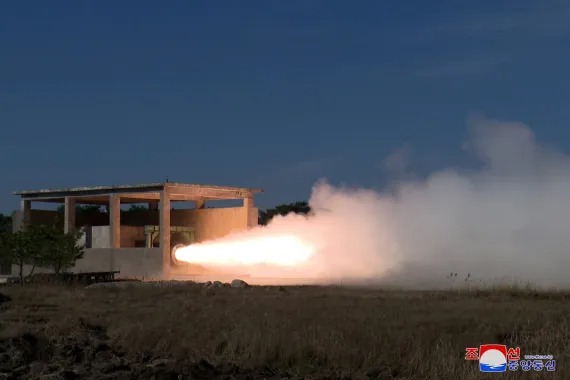North Korea has once again raised alarms by conducting successful static tests of a “new type, high-thrust” solid-fuel engine for its banned intermediate-range ballistic missiles (IRBM). The tests, shrouded in secrecy, occurred on November 11 and 14, marking a significant step forward in Pyongyang’s relentless pursuit of military modernization, despite strict United Nations restrictions on ballistic missile development. This latest revelation intensifies concerns about the country’s growing capabilities and the potential ramifications for regional stability.
Technological Breakthrough Raises Strategic Concerns
North Korea’s official news agency, KCNA, reported on Wednesday that the country had achieved a milestone in its military capabilities by successfully developing advanced solid-fuel engines for intermediate ballistic missiles. Describing it as of “important strategic significance,” KCNA highlighted the tests as a substantial step toward accelerating the development of a new IRBM system. The utilization of solid-fuel technology is particularly worrisome for global security, as it enhances missile operational safety, reduces logistical requirements, and makes detection more challenging compared to liquid-fuel alternatives.
Defiance of International Sanctions
The international community, already grappling with the North’s provocative weapons tests, now faces a new challenge as Pyongyang openly flouts UN sanctions. The country, banned from conducting ballistic missile tests, continues to pursue advancements in missile technology, leaving the United Nations and its member states deeply concerned. North Korea’s General Missile Bureau justified the recent tests as essential for strengthening its military’s strategic offensive capabilities amid what it called a “grave and unstable security environment.” This overt violation comes at a time when a Russian delegation, led by Moscow’s natural resources minister Alexander Kozlov, is engaged in talks with North Korean officials on various issues.
Deepening Military Cooperation Raises Global Anxiety
The announcement of successful tests coincided with talks between North Korea and Russia, fueling concerns about the deepening military cooperation between the two nations. The United Nations, citing worries about Russia and China aiding North Korea’s military expansion in defiance of sanctions, expressed heightened unease. Allegations of North Korea sending weapons to Russia for use in Ukraine, coupled with accusations of Moscow providing technical military support, further escalate tensions on the international stage. The fear is that such collaborations could enable Pyongyang to circumvent UN restrictions and rapidly advance its military capabilities.
As North Korea continues its relentless pursuit of military advancements, the international community faces a critical juncture. The successful tests of new solid-fuel engines for IRBMs underscore the urgent need for a united response to address the blatant disregard for international sanctions. The growing military cooperation between North Korea and Russia heightens global anxiety, prompting nations to reassess their strategies in the face of an increasingly complex and volatile geopolitical landscape. The implications of these developments extend beyond regional concerns, posing a direct challenge to established norms of international security.
















